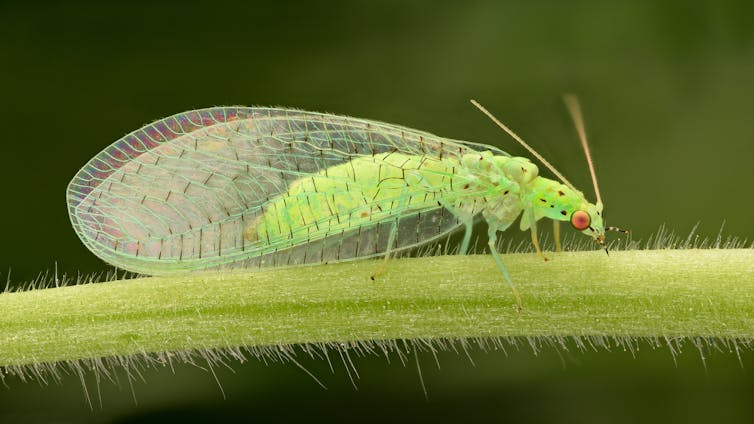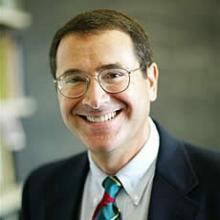Insects are vanishing worldwide – now it’s making it harder to grow food
Over the past 20 years a steady trickle of scientific papers has reported that there are fewer insects than there used to be. Both the combined weight (what scientists call biomass) and diversity of insect species have declined. Some studies were based on sightings by amateur entomologists, while others involved scientists counting the number of bugs splattered on car windshields. Some collected flying insects in traps annually for years and weighed them.
In the past six years, this trickle has become a flood, with more and more sophisticated studies confirming that although not all insect species are declining, many are in serious trouble. A 2020 compilation of 166 studies estimated that insect populations were on average declining globally at a rate of 0.9% per year. But the declines are uneven. Even within the same environments, populations of some insect species have waned, while others have remained stable and still some others increased. The reasons for these differences between insects are unknown, though evidently some are more resilient than others.
Until recently, much of the evidence has been drawn from protected areas in Europe and to a lesser extent North America. So what is the picture like elsewhere? A new study offers fresh data on the seasonal migrations of insects in east Asia. These insects, many of them pest species, fly north in spring every year to take advantage of the new growing season, and fly south in autumn to escape the cold.
Millions of migrating insects
Between 2003 and 2020, scientists from the Chinese Academy of Agricultural Sciences in Beijing caught almost 3 million migrating insects from high-altitude searchlight traps on Beihuang Island off the coast of northeast China. A further 9 million insects were detected from radar records. In all, 98 species were identified and counted, most of which were either plant-eating crop pests or insects that are their natural enemies – predators and parasites. Over the whole 18-year period, the yearly tally of all identified insects fell by 7.6%, a steady downward trend of 0.4% a year.
Insect declines clearly are occurring on a large scale in Asia, just as they have been in Europe and North America. It seems reasonable to assume that the causes are the same. Although we don’t know for certain what those causes are, it seems likely that they operate all over the world.
The study also showed that pest insects such as the black cutworm moth, whose caterpillars attack a wide variety of vegetable crops, are as strongly affected by the global decline of insects as non-pest species such as bees and butterflies that were the subjects of most of the previous European and American studies.
We are so used to considering insects as pests that it is tempting to think that, in a world with fewer of them, agriculture might prosper as never before. This new study reveals why that is not the case. The researchers used detailed entomological records from the past to construct a complex food web showing how each of the insect pest species caught in the searchlight traps can be eaten by several kinds of insect predators and parasites, often termed “natural enemies”. As an example, black cutworm caterpillars are eaten by green lacewings, among others.

The researchers compared how fast 124 pests had declined alongside each of their natural enemies. Over the 18-year study, the abundance of natural enemy species fell at a rate of 0.65% a year, while the plant-eating prey did not decrease in number at all, on average. This suggests that beneficial natural enemy species are more likely to decline than the pests that they feed on. As a result, farmers must either tolerate lower crop yields or use even more chemical insecticides to control pests, leading to still worse declines.
Although it is tempting to point a finger at pesticides, bright streetlights or climate change, insect declines almost certainly have multiple causes that overlap.
The most frequently named suspect is agricultural intensification. This term covers a multitude of sins. Farm mechanisation, the eradication of hedges, crop monocultures, the increased use of chemical fertilisers and regular applications of pesticides are all intended to produce fields without weeds, pests or diseases. Only a reduced range of wild plants and animals can survive in the narrow field margins and neighbouring roadside verges that remain. Another way of putting it is that farmers have made fields unwelcoming to most insects.
Intensification is designed to ensure that as much as possible of the farm ecosystem’s energy flow is diverted into growing crops and livestock for human consumption. It has been estimated that 24% of all plant growth annually is now appropriated by humans, and this rises to a staggering 69% on cropland. These figures roughly doubled over the 20th century. It’s no wonder that insects don’t do well in landscapes such as these, and farmland occupies almost 40% of the land.
Why you’ll miss bugs
Insects are by far the most numerous of all animals on Earth. The estimated global total of new insect material that grows each year is an astonishing 1,500 million tonnes. Most of this is immediately consumed by an upward food chain of predators and parasites, so that the towering superstructure of all the Earth’s animal diversity is built on a foundation of insects and their arthropod relatives.
If insects decline, then other wild animals must inevitably decline too. There is already evidence that this is happening. In North America, insect-eating bird species experienced an average decline in population size of almost 10 million over the past 50 years, while those for which insects are not essential prey did not decline at all. In Europe, parallel declines of insectivorous swallows, house martins and swifts have all been linked to insect declines.
While it’s true that a few insects are a menace to humans (disease-carrying mosquitoes come to mind), the vast majority of insects are friendly: they pollinate crops, provide natural pest control, recycle nutrients and form soil by aiding the decomposition of dead animals and plants. All these processes will slow down if insects become scarce. The economic value of these services is incalculable – agriculture could not continue for long without them.
Our insect friends are being crowded out. Somehow, we must find ways to make more room for them.

Don’t have time to read about climate change as much as you’d like?
Get a weekly roundup in your inbox instead. Every Wednesday, The Conversation’s environment editor writes Imagine, a short email that goes a little deeper into just one climate issue. Join the 10,000+ readers who’ve subscribed so far.
Stuart Reynolds, Emeritus Professor of Biology, University of Bath
This article is republished from The Conversation under a Creative Commons license. Read the original article.

















